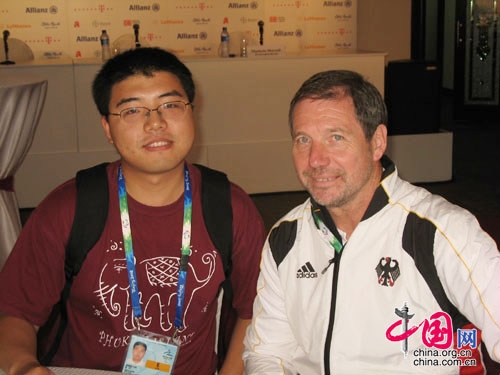China.org.cn: Is this your first visit to Beijing?
Karl Quade: No, I have been in Beijing several times. I have been coming here to prepare for the Paralympics. Germany’s Ministry of Internal Affairs has entrusted me with the task of enhancing cooperation between the two countries in sports events for disabled people.
China.org.cn: What’s your impression of the city?
Karl Quade: Beijing is changing really quickly. I am stunned by the differences in the city compared to my first visit five years ago. Today’s Beijing is a metropolis.
China.org.cn: Would you like to say something about the Paralympic Village? What do you think of the organization of the Paralympics?
Karl Quade: Life for the athletes in the Paralympic Village is very comfortable. It is really hard to imagine that the village could have emerged from what was an area containing just a few houses only two years ago. The village is very beautiful, the design is outstanding, and the facilities are of the highest quality.
|

|
|
Reporter from China.org.cn (left) and Karl Quade, head of the German Paralympic Group |
China.org.cn: How about the volunteers?
Karl Quade: There are lots of volunteers to provide help. I am very glad that we have several volunteers who can speak German since none of us can speak Chinese - a difficult language to learn. The university students, whose major is German, work very hard. They are friendly with us and we are satisfied with their work.
China.org.cn: Beijing’s air quality has been a hot topic in the rest of the world. What do you think of the city’s environment?
Karl Quade: It’s hard to comment on Beijing’s air quality previously as we weren’t here during the Olympic Games, but when our Paralympic group arrived in the city, the sky was clear. Although it has rained in the last two days and the sky has been a little bit overcast, there is no pollution in the air and no problem with air quality. The air in Beijing is as fresh as that in Germany.
China.org.cn: Can you provide a brief introduction to your group?
Karl Quade: The German Group is composed of 171 athletes, and 106 coaches and assistants. About 260 people are in the Beijing Paralympic Village, and the rest are in Qingdao and Hong Kong to participate in the sailing and equestrian competitions.
China.org.cn: Which sports are the German athletes strong in?
Karl Quade: German athletes are good at athletics, swimming and cycling. We also have hopes in table tennis, equestrianism, judo and sailing. We hope to win medals in these events.
|

|
|
German?Paralympic Club, opened?in Beijing on September 7 |
China.org.cn: Have you set any goals for the Paralympics?
Karl Quade: I think the most important goal is to create a good impression of the German group. We’ll prove disabled people can achieve as much as able-bodied people in both sporting and other fields. We are also looking for opportunities to cooperate with China in promoting sports programs for disabled people.
China.org.cn: What do you think sports mean to disabled people?
Karl Quade: Sports are important both to able-bodied and to disabled people. Competition allows disabled people to strive to achieve their potential.
China.org.cn: Can you tell us about how Germany protects the rights of disabled people?
Karl Quade: The law provides that the disabled have the same rights as the able-bodied. The relevant regulations require that public areas such as metro lines and buses must be equipped with disability-friendly facilities. In the field of education, the government supports both standard and special schools in enrolling as many disabled students as possible.
China.org.cn: Thank you for taking part in our interview – may we wish you a happy visit to Beijing!
Karl Quade: It’s a pleasure to accept your invitation. A special thanks to China - to Beijing, Hong Kong and Qingdao for their warm hospitality.
(China.org.cn translated by Wu Jin, September 10, 2008)